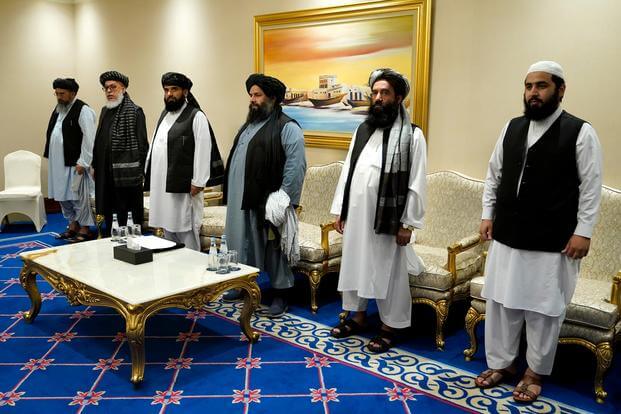One Small Victory for Political Islam, One Giant Leap Backwards for Humanity

In what is a small step for political Islam and one giant leap backwards for humanity, the Afghan government negotiators and the Taliban have agreed to have sharia law and teachings guide them in peace talks now underway in Qatar, according to a document obtained Thursday.
Putting aside that the Taliban has no intention of disavowing its ties to multiple terrorist organizations, including its longtime ally, al-Qaeda, Afghanistan’s future political roadmap may be more than the Afghan government and people—women and underage girls in particular—can bear as the current military balance turns in favor of the Taliban who have control of more territory in Afghanistan since 9/11.
The document details a 21-point list of rules and procedures for the negotiations and sheds light on what the talks, which are taking place behind closed doors, actually look like. The warring sides signed the document last week in Doha, Qatar, where the U.S.-brokered talks began in September and where the Taliban have for years maintained a political office.
As explained by terrorist expert, Terry Bishop, sharia, by its own definition, is supreme to any other form of law, or for that matter, any other kind of democratic structure. Now that it is to be an essential component of the Afghan Constitution, the ability to successfully implement any sort of democracy or human equity is long gone.
What is sharia law?
Sharia literally means the “way” or “path.” Historically articulated, it is a shorthand term for an amorphous body of legal rulings, judgments and opinions, assembled over the course of many centuries after the Muslim Prophet Muhammad’s death. It is based on the Quran and a copious number of hadiths (the sayings and acts of Muhammad) developed by the fuqaha(jurists) whose opinions enjoy an almost absolute authority over the faithful.
As a rule of law, it precludes the development of human reason as it is viewed as an expression of Allah’s inscrutable will. It is this same supremacy that renders sacred and permanent the concept of inequality between the Islamic community and the non-Islamic community, between the Muslim and the non-Muslim, and between man and woman.
There are two essential weaknesses of sharia, due to which the Islamic social realm has been absorbed into the whims of the political one: its autonomy and its incompletion. As a codification of customs, it does not depend on any official body (state or clerical), and therefore there is no universal concordance on its legislation within the Islamic body politic.
Sharia thus generates a zone parallel to a political or authoritative one that can be either circumvented or manipulated by people in authority. It may therefore be said to contain law, but at the same time, it is composed of elements and aspects that are not law per se since it excludes judgement.
Women and underage girls to suffer under the sharia
Women have suffered tremendously during Afghanistan’s 40 years of war. In their strive for peace, they have also fought, putting their own lives at risk, for equality in the years since the fall of the Taliban government and have made great progress. Today there are women ministers and governors and judges and police and soldiers, and Afghanistan’s parliament has a higher percentage of women than does the U.S. Congress. Now all of this may disappear.
Women, because of the Afghan Women’s Council—a non-profit organization that strived to help Afghan women and children by improving their living condition as well as raising the awareness of human rights—were previously able to maintain some rights, which were altogether eradicated once the Taliban took over the reins of government in 1996. Women seeking an education were forced to attend underground schools, where they and their teachers risked execution if caught.

Women were also
- denied medical treatment for illnesses if a male chaperone did not accompany them;
- publicly beaten if their burqas slipped or if an ankle or a strand of hair showed;
- stoned to death for “adultery” when raped;
- even forbidden to laugh out loud as it was considered improper for a stranger to hear a woman’s voice.
Afghanistan also has the 20th highest absolute number of women married or in a union before the age of 18 in the world: 522,000.In fact, 28 percent of Afghan girls are married before the age of 18 and 4 percent are married before their 15th birthday, though the numbers are believed to be much higher.
Afghan law states that girls can give consent to marry at 16, while boys cannot consent until 18. For both genders, children may marry before the legally set age with permission of a judge or the child’s father.

In 2016, a six-year-old girl was rescued after a horrific case of child marriage involving a man 54 years older than her, Sayed Mohammad Karim.
“After the parents gave their daughter to me, they said, ‘You can take her whenever you want,’” he said.
He married her during Ramadan, apparently in the presence of between 30-40 people. He and the girl’s family justified the marriage under the sharia law, which is based on the hadiths (the sayings and acts of Muhammad). As recorded by al-Bukhari, the Prophet of Islam married his favorite wife, Aisha, was six years old when he was in his fifties; Muhammad consummated the marriage when Aisha when she was nine.
How did this come about?
As reported by Military News, notwithstanding resistance by Afghan government negotiators, the U.S.-Taliban deal made it into the introduction part of the 21-point document on the rules and procedures for the Doha talks, after stating that sharia law would be the foundation for the negotiations.
“Afghanistan’s honor and dignity lies in its Islamic identity and national unity,” the document says. “It’s only through the implementation of Islamic justice that Afghanistan can protect its sovereignty and avoid direct and indirect interference.”
The Taliban, after years preparing for a return to power, are now step closer in doing so. In areas currently under their control, the insurgency has replaced the Afghan government with their own administration, including sharia courts and a force of shadow civil servants responsible for an array of tasks from monitoring teacher attendance to collecting taxes.
The reported agreement has apparently not yet been signed by either side. Let us pray and hope that innocent Afghans who want peace and equality before the law, woman and children in particular, will not be abandoned as it seems they already to have been.
__________________________________________________

Mario Alexis Portella is a priest of the Cathedral of Santa Maria del Fiore and Chancellor of the Archdiocese of Florence, Italy. He has a doctorate in canon law and civil law from the Pontifical Lateran University in Rome; he also holds a M. A. in Medieval History from Fordham University, as well as a B.A. in Government & Politics from St. John’s University. He is also author of Islam: Religion of Peace? – The Violation of Natural Rights and Western Cover-Up.
Book available on Amazon, Barnes & Noble or WestBow Press.






Recent Comments